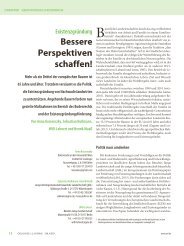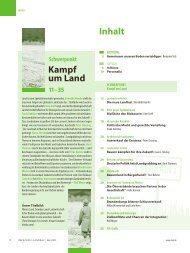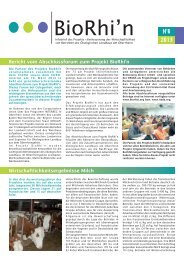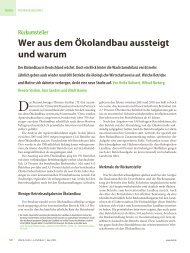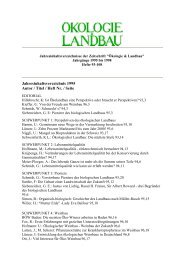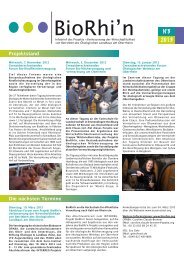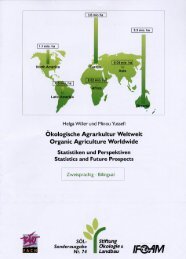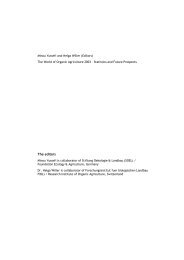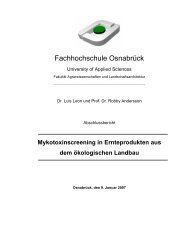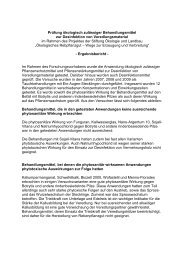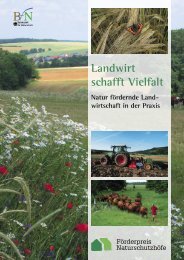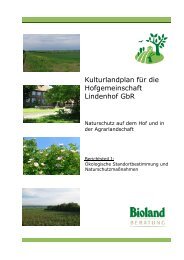the world of organic agriculture - Organic Eprints
the world of organic agriculture - Organic Eprints
the world of organic agriculture - Organic Eprints
Create successful ePaper yourself
Turn your PDF publications into a flip-book with our unique Google optimized e-Paper software.
16 <strong>Organic</strong> Farming in Latin America<br />
in <strong>the</strong> European and US-American import markets.<br />
Meat exporting began ten years ago with beef, and recently Patagonian lamb became <strong>the</strong><br />
predominant export for international markets. In 2005 <strong>the</strong>re were 656’000 sheep and 112’870<br />
heads <strong>of</strong> cattle certified in Argentina.<br />
All <strong>the</strong> products mentioned have been exported for years, many <strong>of</strong> <strong>the</strong>m since 1992.<br />
The domestic market has been working in <strong>the</strong> big cities since 1990, through home deliveries,<br />
supermarkets and specialized shops, but had a downward trend during <strong>the</strong> economic crisis<br />
in 2001 and 2002. Some important companies disappeared from <strong>the</strong> market (Sol de Acuario)<br />
and o<strong>the</strong>rs diminished <strong>the</strong>ir participation in <strong>the</strong> supermarket shelves. Home deliveries, with a<br />
more direct relation with <strong>the</strong> consumers, were able to survive and are now in <strong>the</strong> upward trend<br />
again (El Rincón Orgánico). Some deliveries carry more than 200 different products, especially<br />
vegetables, fruits, oils, teas, breads, eggs and jams. There is also a big company (La Serenisima)<br />
with a massive production <strong>of</strong> <strong>organic</strong> milk on more than 10’000 hectares and many associated<br />
farms.<br />
Argentina was <strong>the</strong> first Third World Country to have a national regulation adapted to <strong>the</strong> European<br />
Union (1992) and <strong>the</strong> first to enter <strong>the</strong> third country list. There are 12 national certifiers, some<br />
<strong>of</strong> <strong>the</strong>m with a strong international presence (Argencert and OIA), and two are steadily growing<br />
(Letis and Food Safety). There is no important activity <strong>of</strong> foreign certifiers.<br />
Argentina has a strong umbrella organization, Movimento Argentino Para La Produccion<br />
<strong>Organic</strong>a (MAPO), which organizes programs, capacity building, research projects, conferences<br />
and meetings. MAPO organized <strong>the</strong> 12th IFOAM Scientific Conference in Mar del Plata, 1998.<br />
There is also a new Trade Chamber, Cámara Argentina de Productores <strong>Organic</strong>os Certificados<br />
(CAPOC), a certifier’s chamber, CACERT, and many local and regional networks. Recently, all<br />
<strong>the</strong>se organizations ga<strong>the</strong>red into an umbrella organization, S.O.A., <strong>the</strong> Argentine <strong>Organic</strong><br />
Sector.<br />
Universities are quite active in <strong>organic</strong> issues, especially <strong>the</strong> National Buenos Aires University<br />
UBA, <strong>the</strong> Catholic University and <strong>the</strong> Salvador University. The National Agrarian Research<br />
Institute INTA has a whole area on <strong>organic</strong> farming, co-coordinated by a former IFOAM World<br />
Board Member, Pedro Gomez. INTA also carries <strong>the</strong> biggest <strong>organic</strong> family garden project in <strong>the</strong><br />
<strong>world</strong>, PRO HUERTA, that reached almost one million families doing home <strong>organic</strong> farming in<br />
<strong>the</strong> 1990´s, suffered a financial crisis, and has been back in action since 2003.<br />
16.7.2 Bolivia<br />
Bolivia has grown from 31’025 certified hectares in 2000 to 364’100 in 2002. In <strong>the</strong> same period,<br />
<strong>the</strong> number <strong>of</strong> farms has gone from 5’240 to 6’500.<br />
The most important products from Bolivia are c<strong>of</strong>fee, quinoa, chestnut, cocoa, vegetables, tea,<br />
herbs and lesser volumes <strong>of</strong> amaranth, dehydrated fruits and beans.<br />
161



